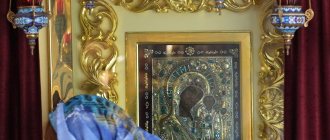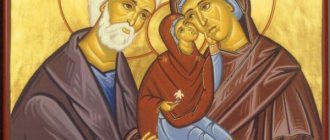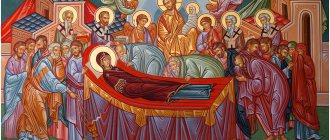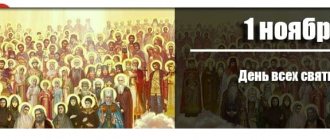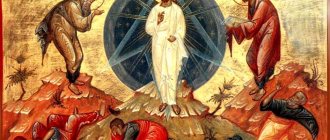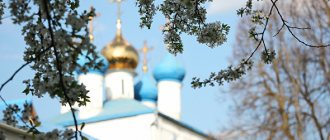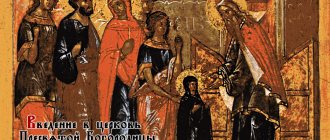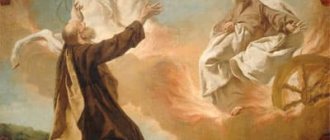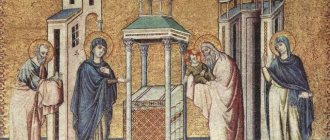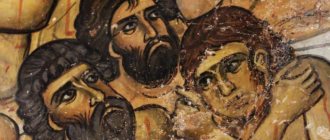The Nativity of the Virgin Mary is a holiday dedicated to the gospel tradition of the birth of the Virgin Mary, Mother of God, mother of Jesus Christ. In Orthodoxy, the holiday is celebrated on September 21 (in 2022 the celebration falls on Tuesday) and belongs to the twelve, that is, the twelve most important, in addition to Easter. The Nativity of the Virgin Mary actually coincides with the autumn equinox - with the onset of calendar autumn, hence the Slavic name of the holiday - Autumn.
In the folk Orthodox tradition, the holiday in honor of the Mother of God was very important. The cult of the Mother of God, the universal woman's intercessor, was very strong in Rus'; the people revered her even more than Christ himself. This day was considered an Indian name day, the end of Indian summer. The popular name of the holiday is the Second Most Pure (The First Most Pure is the Dormition of the Virgin Mary celebrated at the end of August).
History of origin
Every year on September 21, Orthodox Christians celebrate the Nativity of the Blessed Virgin Mary. This holiday is one of the main twelve. People call him the second Most Pure One. For several centuries in a row, Christians have been celebrating not only the Nativity of the Savior, but also the feast of the birth of his most holy mother. After all, it was the Immaculate Virgin Mary who gave believers the Son of God, who saved human nature from the Fall.
All the details of the birth of the Mother of God became known thanks to an apocryphal (not recognized by the Church) text called “The Proto-Gospel of James,” dating back to the middle of the 2nd century. The Holy Scripture itself does not mention this event (the birth of Mary).
The Immaculate Virgin was born in Jerusalem. Her parents lived in Nazareth. Father Joachim was a righteous and wealthy man. He had a lot of livestock. Joachim came from the family of the most glorious king David. The mother of the Virgin Mary was called Anna. She came from a family of clergy.
The couple led a righteous lifestyle, helped the poor, and brought gifts to God. Despite their prosperity, the holy couple had one huge problem - they did not have children. Parents constantly asked God to send them a child. After all, not having children among Jews was considered a punishment for sins. One day, Joachim’s clergyman did not accept gifts for the glory of the Almighty. After all, it was believed that a childless person does not have the blessing of God and has no right to count on the immortality of the soul.
Mary's father went into the desert out of grief and prayed to God for a long time, asking him to send him a child. Anna suffered the most. She also asked the Almighty to give her a child. And then an angel appeared to Anna and said that her prayer had been heard by God, and soon she would give birth to a girl, about whom the whole world would talk. It was necessary to name the daughter Maria, which translated from Hebrew meant “lady” and “hope.” An angel appeared to Joachim and told him to return to his wife and wait for the birth of his daughter.
Soon the already middle-aged couple had a long-awaited daughter, Maria. This happened on September 21. The Church even celebrates the day of Anna’s conception of her most holy daughter. True, there are versions that it was not immaculate. Of course, the Immaculate Virgin Mary was sinless, but was born naturally. The Orthodox Church only considers the Nativity of the Savior pure and immaculate.
Prayers for the Nativity of the Blessed Virgin Mary
Prayer on the Feast of the Nativity of the Virgin Mary
Blessed Virgin Mary, Queen of heaven and earth, we bow down to Your miraculous image, with tenderness: look mercifully on Your servants and through Your omnipotent intercession send down what everyone needs. Save all the faithful children of the Holy Church, convert the unfaithful, guide those who have gone astray to the right path, support old age and weakness of strength, grow the young in the holy faith, guide courage for good, bring sinners to repentance and hear the prayers of all Christians, heal the sick, assuage sorrows, those traveling travel. You weigh, All-Merciful, as we are weak, as sinners, as embittered and unworthy of God’s forgiveness, otherwise be of help to us, so that by no sin of self-love, temptation and the devil’s seduction we anger God: Thee are the Imams, the Intercessor, Whom the Lord will not reject. If you so desire, you can bestow everything upon us, like a source of grace, who faithfully sing to You and extol Your glorious Nativity. Deliver, O Lady, from sins and misfortunes of all who piously call upon Thy holy name and worship Thy honorable image. You cleanse our tuna with your prayers of iniquity, so we fall down to You and cry again: drive away from us every enemy and adversary, every misfortune and destructive unbelief; Through Your prayers, giving timely rains and abundant fruitfulness to the earth, put Divine fear in our hearts to fulfill the commandments of the Lord, so that we may all live quietly and peacefully for the salvation of our souls, for the good of our neighbors and for the glory of the Lord, for He is the Creator, Provider and Savior All glory, honor and worship are due to us, now and ever and unto ages of ages. Amen.
Prayer before the icon of the Nativity of the Blessed Virgin Mary
Oh, Most Holy Lady, God-chosen Mother of Christ our Savior, asked of God with holy prayers, dedicated to God and beloved by God! Whoever does not please You or who does not sing Your glorious Nativity. Your Christmas was the beginning of the salvation of people, and we, sitting in the darkness of sins, see You, the dwelling of the Impregnable Light. For this reason, the florid tongue cannot sing songs about Thee according to its heritage. Thou art more exalted than the Seraphim, O Most Pure One. Otherwise, accept this present praise from Your unworthy servants and do not reject our prayer. We confess your greatness, we bow down to you in tenderness and boldly ask your child-loving and compassionate Mother, who is quick in intercession: beg your Son and our God to grant us, who have sinned a lot, sincere repentance and a pious life, so that we may be able to do everything pleasing to God and useful to our souls. Let us hate all evil, strengthened by Divine grace in our good will. You are our shameless hope in the hour of death, grant us a Christian death, a comfortable procession through the terrible ordeals of the air and the inheritance of the eternal and ineffable blessings of the Kingdom of Heaven, so that with all the saints we silently confess Your intercession for us and let us glorify the one True God, worshiped in the Holy Trinity, Father and Son and Holy Spirit. Amen.
Prayer to the Nativity of the Virgin Mary
Oh, Most Pure and Most Blessed Virgin, Lady Theotokos, born from barrenness according to promise, and for purity for the sake of Your soul and body, deemed worthy to be the Matter of the Son of God, our Lord Jesus Christ, now dwelling with Him in heaven and having great boldness towards the Most Holy Trinity, from the Unborn , like a Queen, you are crowned with the crown of eternal reign. In the same way, we humbly resort to You and ask: intercede for us from the All-Merciful Lord God the forgiveness of all our sins, voluntary and involuntary; to our suffering fatherland salvation, peace, silence and piety restoration, times are peaceful and serene, sedition of the evil is not involved; to the abundance of the fruits of the earth, the air of goodness, the rains are peaceful and well-timed. And ask us for everything that we need for life and salvation from Thy Son, Christ our God. Most of all, let us make haste to be adorned with good morals and good deeds, so that, as powerfully as possible, we will be imitators of Your holy life, with which You adorned yourself from your youth on earth, pleasing the Lord; For this reason you appeared, the most honest Cherub and the most glorious Seraphim. To her, Most Holy Lady, be our quick Helper in everything and the wise Teacher of salvation, so that by following You and being helped by You, we may be considered worthy of being the heir to the existence of the Heavenly Kingdom, through the sufferings of Your Intercessory Son, and fulfillers of His promised holy commandments. For You are, Lady, our only hope and hope according to God, and we commit our whole life to You, hoping for Your intercession and intercession that we will not be put to shame at the hour of our departure from this life, and at the Last Judgment of Your Son, Christ our God at His right hand to be worthy of standing, and there to rejoice forever with all those who have pleased Him from time immemorial, and to silently glorify, praise, thank and bless Him with the Father and the Spirit forever and ever. Amen.
Celebration traditions
The Holy Church began to celebrate the Nativity of the Immaculate Virgin Mary only in the 5th century. Christians have been glorifying the Mother of God for many centuries in a row, who gave birth to the world a Savior, who took upon himself all the sins of mankind and atoned for them at the cost of his own life.
This is the first holiday celebrated after the beginning of the church year (September 14). In honor of the Nativity of the Mother of God, the clergy annually perform a festive Liturgy. The birth of the Immaculate Virgin Mary is celebrated on September 21. The date of the holiday does not shift and does not depend on other church celebrations. In 2022, as well as in future years, the Nativity of Mary will be celebrated on September 21.
When is the Nativity of the Virgin Mary celebrated?
Orthodox Christians celebrate the Nativity of the Virgin Mary on September 21 according to the new style (September 8 according to the old style). This is a permanent holiday, that is, its date remains the same every year.
The holiday, according to Orthodox tradition, lasts 6 days, from September 20 to 25. This period includes pre-celebration and post-celebration. Forefeast - one or several days before a major holiday, the services of which already include prayers dedicated to the upcoming celebrated event. Accordingly, after-feasts are the same days after the holiday.
Divine service
In honor of the Nativity of the Virgin Mary, a festive service is held in churches on September 21. During the Liturgy, the troparion, kontakion, dignification and magnification are read. For the holiday, all clergy prepare festive sermons in which they talk about the miracle of the birth of the Virgin Mary. The Almighty gave the daughter Mary to elderly and barren parents. This woman later became the mother of the Son of God, who saved humanity from the Fall.
Canon
In the morning at the festive service, an entire solemn poem consisting of nine songs is read. Each hymn consists of an irmos (initial stanza) and several troparion stanzas glorifying the Mother of God. The entire text of the festive canon is dedicated to the Nativity of Mary and the glorification of the Mother of God. The songs ask to confirm believers in the faith and send them forgiveness of sins.
Song 1
Irmos: Come, O people, let us sing a song to Christ God, who parted the sea and taught the people, even as He brought forth from the work of the Egyptians, as if He were glorified.
Come, faithful ones, rejoicing in the Divine Spirit, Even from this barren day we will honor the Ever-Virgin Lady who came to save people with songs.
Rejoice, Pure One, Mother and Servant of Christ God, Even the first Intercessor of bliss, the human race, we all worthily glorify Thee with songs.
Today a bridge is born of life, whereby men glorify Christ the Giver of Life with songs, the cry of the fall, which was found from hell.
Song 3
Irmos: Establish us in You, Lord, the Tree that kills sin, and plant Your fear in the hearts of us who sing of You.
You lived immaculately to God, begetting Salvation of all, God-wisdom parent of the Creator of the Birth and our God.
The Lord, who exuded life to all, from barrenness, gave birth to the Virgin, who willed to dwell in Nyuzha, and after Christmas, preserving the incorruptibility.
Anna's fruit, Mary, today, who gave birth to the life-giving grape, as we sing to the Mother of God, the Representative of all and the Helper.
Sedalen, voice 4
The Virgin Mary and Mother of God truly, like a cloud of light, will rise to us today and will come from the righteous to our glory. Adam is not condemned to anyone, and Eve is freed from her bonds, and for this reason we cry out loudly with boldness to the One Pure Ones: joy proclaims Your Nativity to the whole universe.
Song 4
Irmos: Hear the Lord, hear Your gaze and glorify You, the One Lover of Mankind.
We sing praises to You, Lord, who has given the faithful a saving refuge to all, Who gave birth to You.
You are the bride of God, show Christ praise and power to all who sing Your sacrament faithfully.
Unartful Lady, with Your prayers we deliver from sins, we prudently please You all.
Song 5
Irmos: The hay-written darkness of fortune-telling has destroyed and the faithful with the arrival of the truth, the Virgin Mary, illuminating the hearts, and instruct us with Your light, Christ.
Let us sing to the people of all the guilt of being guilty of us: Even though the prophets rejoice in this image, the revealed salvation from Him is fruitful.
From the dry vegetation of the priest's rod, Israel was shown insight, and now the lightness of the vegetated shines gloriously, from the barrenness an all-glorious birth.
Song 6
Irmos: Jonah cried out to the Lord from the whale: You raise me up from the depths of hell, I pray, so that as a Deliverer, with a voice of praise, I will devour the truth in the Spirit.
To the Lord, in the sorrow of barrenness, the parents cried out to the Mother of God of Godly wisdom, and to this mother from generation to generation, for common salvation and praise.
I have received the Heavenly gift from God, worthy of the Mother of God, the parents of the Divine Wisdom, the samekh of the Cherubim who carried more than the Word, the Mother of God and the Creator.
Kontakion, voice 4
Joachim and Anna were reproached by childlessness, and Adam and Eve were freed from the aphids of death, O Most Pure One, in Thy holy Nativity. Then Thy people also celebrate, having been freed from the guilt of sins, always calling upon Ty: the Mother of God and the Nourisher of our life bears barren fruits.
Ikos
The prayer and sighing of the barrenness and desperation of Joachim and Anna are favorable and in the ears of the Lord below, and the fruit of the vegetative life is life-giving to the world. She prays in the mountain, and she bears reproach in the garden, but with the joy of barrenness she gives birth to the Mother of God and the Nourisher of our life.
Song 7
Irmos: The bush in the mountain, the fire-scorching one, and the dew-bearing cave of the Chaldeans, has ordained You, the Bride of God, the Divine One, the Immaterial One in the material womb. You have received the fire without burning. Moreover, from You we sing: Blessed are You, God our Father.
Your lawmaker is forbidden to understand in material phenomena the great, Most Pure, mystery; not to be wise, earthly and zealous is figuratively punished sometimes. Moreover, I was amazed at the miracles, saying: Blessed be God our father.
The mountain and the door of heaven and the mental ladder of the divine face of the pronunciation of God, for from you the stone was cut off not by the hands of men, and the door, through which the Lord passed, who is the God of miracles ours.
Song 8
Irmos: In the cave of adolescence you sometimes represented Your Mother, O Lord, and this image is taken from the fire of the unburned One who came in, and we sing of You, who is the end of the day, and we extol to all eyelids.
Even to the God of our reconciliation the predestinated tabernacle even now begins to be, having given birth to the Word, to us the foolishness of the Flesh appears, Whom we eat, from those who do not exist in the hedgehog. moss, and we exalt to all ages.
Resolve the infertility of the worldly good, and clearly show the miracle of Christ, having come to the earthly, Him we eat, from those who do not exist, we receive Him, and exalt Him to all ages.
Song 9
Irmos: Even before the Sun, the Lamp of God, who arose, came to us carnally, from the side of the Maiden indescribably embodied, Blessed All-Pure, We magnify You, Mother of God.
Who has poured out water from stones to disobedient people, and with a submissive tongue bestows fruit from barren loins for our joy, You, Most Pure Mother of God, we deserve to magnify.
In vain is the ancient remover of condemnation and the foremother of correction, just as the generation was taken to God, to the Creator of the bridge, we magnify Thee, the Mother of God.
Luminous
From the barren day of Anna came forth, O Mother of God, all the incense of the Divine, fulfilling the ends of the world, and filling all creation with joy, Who sings, we worthily praise, as I exist on earth exceeded relatives.
Kontakion
The holiday kontakion says that Joachim and Anna atoned for their childlessness by giving the world the Mother of God. The mercy of the Almighty, who once saved Adam and Eve from corruption, descended on the couple. Mary gave birth to the Savior, who atoned for the sin of people at the cost of her own life. Barren Anna gave the world the Mother of God and, together with her husband Joachim, received the immortality of the soul.
“Joachim and Anna suffered the reproach of childlessness, and Adam and Eve were freed from mortal aphids, O Most Pure One, in Thy holy Nativity. Then Thy people also celebrate, having been freed from the guilt of sins, and always call upon Thy: infertility gives birth to the Mother of God and the nourisher of our life.
Joachim and Anna were freed from reproach for childlessness, and Adam and Eve were freed from death by Your holy Birth, Most Pure One. It is also celebrated by Your people, who have been delivered from the burden of sin, loudly exclaiming to You: the barren gives birth to the Mother of God and the nourisher of our Life.”
Folk traditions and signs
There are many folk signs associated with the Feast of the Nativity of the Virgin Mary. On this day (September 21) it is customary to monitor the weather. If it is sunny on the Second Most Pure Day, then the second half of autumn will be warm. Fog and rain are harbingers of bad weather. Strong winds and a sharp drop in temperature foreshadow severe frosts in the winter months.
Dew is used to judge how much snow will fall in winter. If the grass on the Second Most Pure is wet before lunch, it means there will be a lot of snow in the winter months. If there is little dew on this day or it dries quickly in the sun, then the winter will be without snow.
Bird watching is recommended for September 21st. If they are circling high in the sky, it means that the second half of autumn will be warm. If the birds huddle close to the ground, the rest of the autumn days will be cold.
The Feast of the Nativity of the Virgin Mary has been celebrated for many centuries in a row. Over such a long time, a tradition has developed to celebrate this most glorious day. In the morning on the Second Most Pure Day, it is customary to go to church and glorify the Immaculate Virgin. In their prayers, childless women can ask Mary to give them a child. On this day, pregnant women pray to the Mother of God for an easy birth. Housewives traditionally bake bread on this day with the letters “R” (Christmas) and “B” (Virgin Mary). It is consecrated in the church and kept under icons. During illness, you need to break off a piece of bread and eat it.
On the morning of September 21, it is customary to wash your face with dew before sunrise. This procedure helps women maintain beauty and youth for a long time. Young girls, having washed themselves with dew or water from the river before sunrise, can soon wait for matchmakers.
The Ospozhinka Harvest Festival is considered very important especially for newlyweds
Opozhinki is also a harvest festival, which was sometimes celebrated for a whole week - with games, songs, dances, and feasts. The autumn people were met by the water. Early in the morning, women went to the banks of rivers and lakes with bread. The older woman stood with a loaf of bread, and the young women sang songs to the glory of the Mother of God. After this, the bread was broken into pieces according to the number of those gathered: each woman took her piece home and fed it to the cattle.
Relatives came to the newlyweds on the Most Pure One: they watched how they lived, taught them wisdom. The young housewife had to feed the guests a delicious dinner and give the parents round pies, and her husband had to show the farm: livestock in the barns, harness and tools in the sheds. This day was also called Lukov or Pasikov - from the words “onion” and “apiary”. At this time, onion harvesting continued in the gardens, and bees were prepared for wintering in the apiaries. On the Most Pure Day, on the day of the autumn equinox, they celebrated the second meeting of autumn and observed signs. If the weather was good, then the whole autumn should have been like this.
This celebration is considered very important, so believers try to put aside hard work and other worldly activities in order to devote the day to going to church, praying and communicating with loved ones.
Iconography
A huge number of icons were painted in honor of the birth of the Immaculate Virgin Mary. The oldest painting that has survived to this day is considered to be the painting of the Georgian temple in Ateni, dating back to the 11th century. In honor of the Nativity of the Virgin Mary, a fresco was painted in the apse of the Kyiv St. Sophia Cathedral. This image also dates from the 11th century. An ancient drawing in honor of the birth of Mary is in the Transfiguration Cathedral of the Mirozh Monastery, in the Serbian Church of Joachim and Anna in the Studenica Monastery.
Ancient icons depict the most holy Anna lying on a high bed. Icon painters painted her figure larger than other characters. Women with gifts stand near the woman in labor. In the foreground of the composition is Mary being bathed by her maids in the font.
On icons of the late period, tables were depicted with gifts brought in honor of the birth of the Mother of God. Icon painters also depicted the background story of the birth of the Immaculate Virgin. They painted icons where the high priest refuses to accept gifts from Joachim, as well as a plot where Mary’s father cries in the desert, and her mother prays in the garden. There are icons where the parents of the Most Holy Theotokos meet at the Golden Gate. Icon painters depicted the holy couple alone or with a baby in their arms.
House of Joachim and Anna
The House of Joachim and Anna is one of the Christian landmarks of Jerusalem. As Church Tradition says, the Virgin Mary was born in the house of her parents - the righteous Joachim and Anna. It was located in the northeastern part of Jerusalem, now the territory of the Muslim Quarter of the Old City, near the Lion Gate.
Orthodox and Catholics still argue over where exactly the house stood, and built the monastery and basilica 70 meters apart.
The Orthodox monastery of St. Anne is a place of pilgrimage for many Christians around the world. On the ground floor of the monastery there is a church in honor of the Nativity of the Mother of God, and under the monastery building there is an ancient cave. It is believed that this cave is part of the house of Joachim and Anna. KIKTENKO Elizaveta
Magazine "Foma"
What not to do on this day
On the Nativity of the Virgin Mary, it is forbidden to quarrel and conflict with family, friends and neighbors. On this bright holiday, it is recommended to go to church, pray to Saint Mary and spend the whole day in prayer and glorification of the Immaculate Virgin.
On September 21, Christians fast if the holiday falls on Wednesday or Friday. Traditionally, pies with fish and mushroom filling are baked on the Second Most Pure Day. On this day, it is imperative to treat the poor and give alms to the poor. Even the crumbs from the table must be fed to the animals. If you fail to give gifts to low-income people for the holiday, then wealth may leave your home.
It is forbidden to walk barefoot on the ground on September 21. After all, on this autumn day winter is knocking on the door, and a barefoot person can catch a cold and become seriously ill. You cannot wear new or tight shoes on the Second Most Pure Day, especially those that cause calluses. This is not good. Signs associated with bare feet are associated with Mary, who walked without shoes during her life.
On the Second Most Pure Day you cannot garden, clean the house, chop wood, mow hay, or sew. All matters must be postponed until later. It is prohibited to pick up knives or scissors on this day. During her lifetime, the Mother of God suffered from an attack by robbers who wounded her with a knife. Even the bread for the Nativity of the Virgin Mary must be broken off by hand.
What is the Nativity of the Virgin Mary
The Nativity of Our Most Holy Lady Theotokos and Ever-Virgin Mary is the full name of the holiday that the Russian Orthodox Church celebrates on September 21 according to the new style (September 8 according to the old style). This is one of the twelve Orthodox holidays. The twelfth holidays are dogmatically closely connected with the events of the earthly life of the Lord Jesus Christ and the Mother of God and are divided into the Lord's (dedicated to the Lord Jesus Christ) and the Theotokos (dedicated to the Mother of God). Nativity of the Virgin Mary - Feast of the Mother of God.
The event we celebrate on this day is not described in the New Testament. Knowledge about him came to us from Church Tradition, one of the sources of our doctrine, along with the Holy Scriptures.
The legend telling about the Nativity of the Virgin Mary, namely the Proto-Gospel of James, was written in the 2nd century. And they began to celebrate the holiday as a separate significant day in the second half of the 5th century. We read about this, for example, from the Patriarch of Constantinople Proclus (439-446) and in the breviary (liturgical book) of Pope Gelasius (492-426).
Old Believer churches
The Nativity of the Most Holy Theotokos, as a great holiday, has always been revered by Russian Old Believers. In honor of this event, Old Believer churches were even consecrated. For example, in the city of Orekhovo-Zuyevo, Moscow region in Russia, there is still a functioning Church of the Nativity of the Blessed Virgin Mary, built by Old Believers back in 1884. The ancient building is protected by law.
In the city of Vilkovo, Odessa region in Ukraine, there is a church founded in the 19th century in honor of the Nativity of the Virgin Mary, also built by Old Believers. Another ancient Old Believer temple, built in honor of the birth of the Immaculate Virgin, is in the village of Cherten, Kaluga region in Russia. True, the church is desolate and destroyed.

